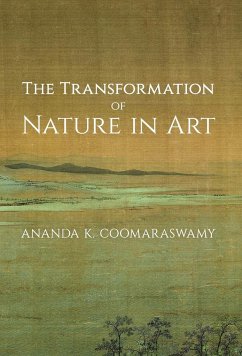
The Transformation of Nature in Art
Versandkostenfrei!
Versandfertig in über 4 Wochen
21,99 €
inkl. MwSt.

PAYBACK Punkte
11 °P sammeln!
In The Transformation of Nature in Art, Ananda Coomaraswamy explains the theory behind medieval European and Asian art, especially art in India. He further supplements the Indian theory with that of the Chinese. The first principle of Asian art is that art does not exist for its own sake; it exists as means to religious conditions or experience. The comparison with medieval European art in this respect is extremely illuminating. He further shows that both differ radically from post-Renaissance European art. Coomaraswamy first discusses the theory of art in Asia and contends that the Indian art...
In The Transformation of Nature in Art, Ananda Coomaraswamy explains the theory behind medieval European and Asian art, especially art in India. He further supplements the Indian theory with that of the Chinese. The first principle of Asian art is that art does not exist for its own sake; it exists as means to religious conditions or experience. The comparison with medieval European art in this respect is extremely illuminating. He further shows that both differ radically from post-Renaissance European art. Coomaraswamy first discusses the theory of art in Asia and contends that the Indian artist did not seek an illusion of Nature; rather, he tried to create a truthful suggestion of the character of the subject. In the second chapter he examines medieval European aesthetics in terms of the fourteenth-century German mystic, Meister Eckhart. Subsequent chapters investigate through Indian texts the psychology of the Indian view of art. And finally, the origin and use of images in India are discussed. The late Ananda K. Coomaraswamy, curator of Indian art at the Boston Museum of Fine Arts, uniquely combined the roles of art historian, philosopher, orientalist, linguist, and expositor. His knowledge of the arts and handcrafts of the Orient was unsurpassed, and his numerous monographs on Oriental art either established, or revolutionized, entire fields. Coomaraswamy was one of the foremost Orientalists of his time, with an almost unmatched understanding of traditional culture. He mastered the philosophic and religious terrain of the entire premodern world, East and West; and for him primitive, medieval European, and classical Indian experiences of truth and art were only different dialects of a common language.


